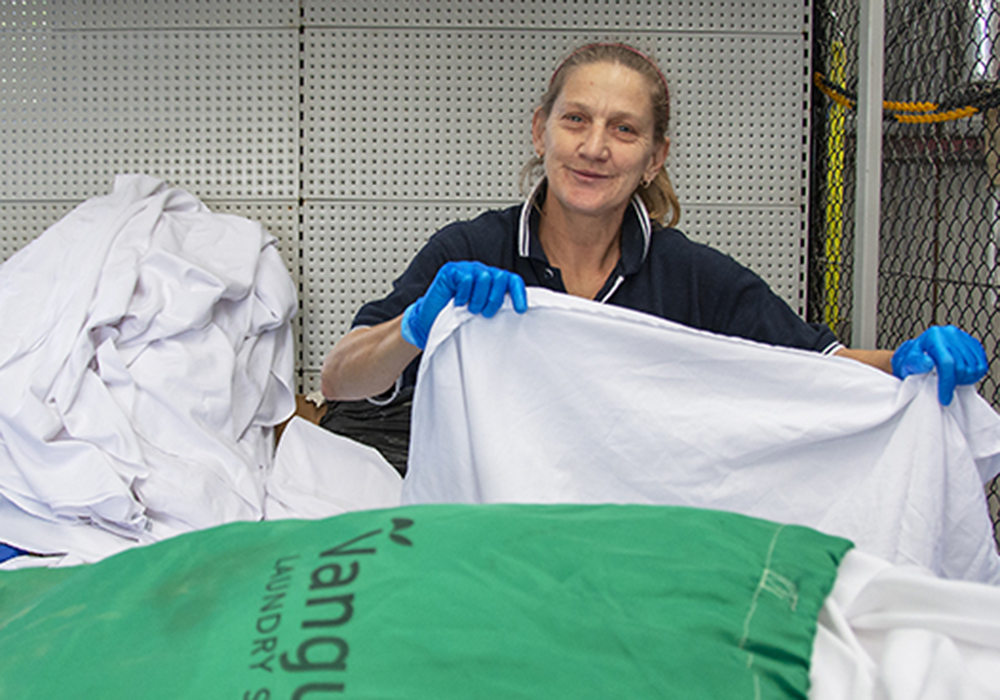Three-year research program evaluates Vanguard's impact


As people across Australia grapple with the social and economic impacts of COVID-19 it’s clear we’ll need to draw on our resourcefulness, innovative spirits and kinship to get through these extraordinarily challenging times.
Peak bodies, including Philanthropy Australia and the Australian Council of Social Service (ACOSS), have welcomed the extension of economic relief measures to the for-purpose sector, but concerns remain about how our most vulnerable community members will be supported and how social enterprises across Australia will be impacted.
Evaluating Vanguard's impact
When Margaret* was depressed, desperate for work and facing homelessness, Vanguard Laundry Services gave her a lifeline in the form of a job offer.
Vanguard is one of the estimated 20,000 social enterprises in Australia that exist to create positive social impact, rather than private profit. Their specific purpose is to employ people, just like Margaret, with lived experience of mental illness – one of the most disadvantaged groups in our country when it comes to employment.
Vanguard was established after local communities in Toowoomba (QLD) were asked what they needed. People who had experienced mental illness were telling Luke Terry - then the CEO of local mental health organisation, Toowoomba Clubhouse, and now Director (and Founder) of Vanguard - that they needed paid work.
At the same time, St Vincent’s Health - who had recently had to close their laundry - was in need of a local hospital-grade laundry service. The idea for Vanguard Laundry Services was soon born, and with hard work and the help of many funders and supporters (including philanthropists, foundations, corporations and government), the idea was realised.
Through a research partnership between the Centre for Social Impact Swinburne and Vanguard Laundry Services, funded by the AMP Foundation , I have been able to undertake a 3-year program evaluating Vanguard’s social impact.
Through this research I’ve discovered many stories, just like Margaret’s – demonstrating the impact a job in a flexible and supportive workplace can have on a person’s life.
In 2019, its third year of business, Vanguard:
- Employed 111 people, 65 of whom had a lived experience of mental illness and a history of unemployment (who are Vanguard’s target employees).
- Generated over $2.2 million in laundry income and paid over $1.5 million in employee wages (FY19)
- Increased target employees’ median total income by 37.7%, with a 27.8% reduction in total gross Centrelink payments in participants’ first year of employment
Increases in total income saw the proportion of staff in housing stress reduce by more than half and the majority of Vanguard staff reported improved health, and increased support networks.
Data from Queensland Health on 25 of the research participants also showed that overall hospital admissions reduced, and people spent 241 less days in hospital in the year since working at Vanguard.
These findings illustrate the broad positive impacts that social enterprises such as Vanguard can have, both for the people who they employ and serve, and for the local economy.
But this kind of innovative response to social disadvantage takes more than one entrepreneur with an understanding of community needs and a feasible business idea – it takes will, creativity, commitment of resources, and collaboration across sectors to make this happen.
These collective efforts to support local social economies will continue to be vital and worthy of consideration in longer term plans to stimulate Australia’s economy, and more than ever we need to recognise our shared goals and find ways to work together to create positive and lasting social impact.
* Margaret’s name has been changed to protect her privacy.
